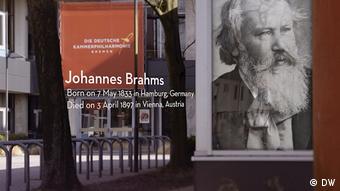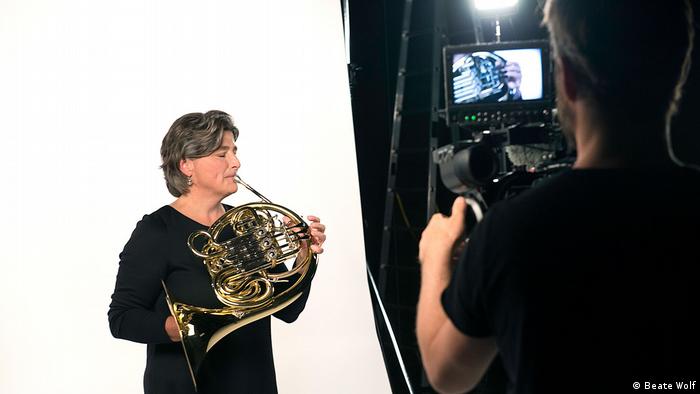A DW-TV production embarks on the traces of Johannes Brahms – together with the star conductor Paavo Järvi and the Deutsche Kammerphilharmonie. A challenge and an adventure at the same time.

Relentlessly, the timpani beats at the beginning of the 1. Symphony of Johannes Brahms, he has worked for a whole 14 years. Powerful and merciless, as if the rhythm was going to say: “just as it is, so it must be and not otherwise”.
“This music is great. Not only because it reflects the time in which it was written, but because it is also a Soundtrack of our time”, says conductor Paavo Järvi in the first few minutes of the DW movie, “Brahms Code” and answer the question of why one should go on a one and a half hour journey into the depth of the Brahms symphonies.

Explorers, Entrepreneurs, Allies: German Chamber Philharmonic Bremen
The allies – on the road again
Together with the musicians of the Deutsche Kammerphilharmonie Bremen, a sworn soloists Association, explored the Estonian Maestro Järvi and the four symphonies of the North German genius Johannes Brahms. To think and seek together, to laugh and argue sometimes. Cameras accompany the musicians during rehearsals and at the performance of the cycle in Paris – the history of the “Théâtre des Champs-Élysées”. “Of course it is madness, to be able to in this city for a whole cycle,” says the flutist Bettina Wild. “Two concerts in a row, only with our symphonies, with no soloist, contributes a rule, the hall is full. Only we with our Brahms in the center, which is a Sensation!”
Music as a common cause of strong individuals – that is, for years the recipe for success for the Deutsche Kammerphilharmonie Bremen. The special orchestra, which has its origin as a merger of like-minded music students and administers itself, reinventing itself with each project. The Estonian conductor Paavo Järvi, at the time one of the most sought after Maestri in the world, played in the chamber orchestra in the world. With the common cycle of the Beethoven symphonies, you set standards, it is the symphonies of Robert Schumann followed. And now there are the symphonies of Johannes Brahms.

Christian Berger and the Team at the shoot in Paris
“In the last few years, I’ve played with the Philharmonic chamber orchestra of only Brahms,” says Paavo Järvi. “For the orchestra, it has become almost a religious Ritual that really before each concert will be rehearsed – no matter how often we played the piece already. There are each Time new colors to discover the nuances and facets.”
Director Christian Berger: trilogy completed
To go So deep into the musical Detail and the spiritual depth of each individual measure, is a luxury that only a few orchestras have – a luxury that even the spectators thanks to the movie “Brahms Code” given to. The Film “The Brahms Code” of the Director and DW’s culture editor Christian Berger is now the third co-operation with the Deutsche Kammerphilharmonie Bremen and Paavo Järvi. When working on the films “The Beethoven project” (2010) and “Schumann at Pier2” (2012), developed between the film crew and artists have a relationship of trust, which made the new Brahms Film possible in the first place.

An “almost divine” figure: the composer Johannes Brahms
“This orchestra was always particularly and is particularly remained, even if the time between the first and the last Film for eight years,” says Christian Berger. “Each of the three films has its particularity. The first Film was a portrait of the orchestra and the conductor. In the second Film, we have concentrated on Schumann’s symphonies, and very expensive, the music is staged, so to speak, a concert held for the production of a film.” Brahms-the movie is both: It presented to musicians and the conductor as a conversation partner and go seamlessly on to the concert footage from Paris.
What comes out at the end, is great music. He provides new insights about the “old” Brahms. So Maestro Järvi falls to the Tempos of the 2. Symphony the image of the elegant, prancing Lipizzaner horses of the Spanish riding school, and at other Times he speaks of a “mad German Tango”.

The Film lives from its protagonists: horn player Elke Schulze Höckelmann
The people behind the music
Even if the charismatic Maestro Paavo Järvi is in the center, succeeds Christian Berger orchestra musicians to get out of the anonymity. “It was important for me, from the heroic image of the conductor, the power, everything, to get away,” explains Berger. “Each of the orchestra’s musicians, is an artist with their own thoughts and their own Interpretation.” So the horn player Elke Schulze Höckelmann rebelled ever against the request of the Maestros, to hold a break for as long as possible: “The longer I’m on a break, the harder it is to play again, too. Because you have to find a mix, pause for a moment, but to remain in the river.”
“Interested in hope as a Director and as a viewer and I, the interested people, because then one understands perhaps a little bit more, how an orchestra works, what people are actually sitting there on the drum or the Cello, what is the concert master makes,” says Christian Berger. “At the end of the film one has the feeling to have many new good friends won an orchestral musician, you will perceive never a flat rate as an orchestral mass. And it assumes to be the genius of Brahms a step closer.”
The two-part Film “Brahms Code” is in the DW-TV programme on 13. and 14. October broadcast and is on “DW Documentary” and YouTube.
Broadcast times:
Part 1:
DW English+
SO 13.10.2019 – 02:00 UTC
MO 14.10.2019 – 10:30 UTC
Vancouver UTC -7 | New York UTC -4 | Sao Paulo UTC -3
DW English
SA 12.10.2019 – 16:15 UTC
SO 13.10.2019 – 01:30 UTC
SO 13.10.2019 – 13:30 UTC
MO 14.10.2019 – 02:45 UTC
MO 14.10.2019 – 09:15 UTC
DI 15.10.2019 – 06:00 UTC
Neu-Delhi UTC +5,5 | Bangkok UTC +7 | Hong Kong UTC +8
Part 2:
DW English+
SO 20.10.2019 – 02:00 UTC
MO 21.10.2019 – 10:30 UTC
Vancouver UTC -7 | New York UTC -4 | Sao Paulo UTC -3
DW English
SA 19.10.2019 – 16:15 UTC
SO 20.10.2019 – 01:30 UTC
SO 20.10.2019 – 13:30 UTC
MO 21.10.2019 – 02:45 UTC
MO 21.10.2019 – 09:15 UTC
DI 22.10.2019 – 06:00 UTC
Neu-Delhi UTC +5,5 | Bangkok UTC +7 | Hong Kong UTC +8

